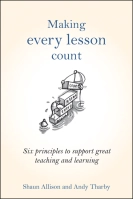 If Penguin are looking to publish a classic about teaching, they should consider the one above. Pam McCulloch is a science teacher who has worked at Durrington High School since 1978. Last year, Pam retired from full time teaching, but still works with us doing some one to one support work. When you look back at how Pam’s classes achieved over the years, the results are simply stunning. Year after year, her classes consistently achieved way above what was expected of them. Very few teachers come close to this level of excellence over a few years – and certainly not over decades. So with this in mind, I wanted to sit down with Pam and ask her how she did it – what was the secret of her success? The following article is a summary of the main points Pam made during our discussion.
If Penguin are looking to publish a classic about teaching, they should consider the one above. Pam McCulloch is a science teacher who has worked at Durrington High School since 1978. Last year, Pam retired from full time teaching, but still works with us doing some one to one support work. When you look back at how Pam’s classes achieved over the years, the results are simply stunning. Year after year, her classes consistently achieved way above what was expected of them. Very few teachers come close to this level of excellence over a few years – and certainly not over decades. So with this in mind, I wanted to sit down with Pam and ask her how she did it – what was the secret of her success? The following article is a summary of the main points Pam made during our discussion.
- It’s very important to remember that children get one shot at education – so we’ve got to make it count for them. If we don’t, nobody else will.
- I was born, educated and grew up in Glasgow, in a very poor community – it was hard. So education was everything. It gave you options in life. This informed my approach to teaching – I had no choice but to make them succeed. I would tell my students – you’re here to learn, you’re going to learn and this is how we’re going to do it. And that was that – it was non-negotiable! Hard work and effort is everything – nothing is just going to fall into your lap!
- Young people are lovely – be nice and pleasant to them, but always remember you’re the professional and you’re in charge – and they will do what you ask them. So there always needs to be a line. It’s for this reason that I always thought it was very important to dress professionally. You’ve got to look the part!
- Know your subject. If you’re going to make the content you are teaching interesting, add breadth and depth and push them to learn deeply, you’ve got to have a great subject knowledge yourself. This is really important. So stay on top of your subject by reading around it all the time.
- Don’t take any nonsense from them. They are there to learn, so if they’re misbehaving, address it immediately and sort it out. Everybody must feel comfortable and able to learn – they can’t if people are fooling around. I always greeted them with a smile…..but would always use a wee bit of menace when necessary! On the first day of the new school year, when they would line up outside my classroom for the first time, I would always notice a little grimace on their face. I always thought that was a good thing, because they knew I was going to make them work hard.
- Have sky high expectations of them. I always told them I expected nothing less than A* grade work from them. I would never lower my expectations – that was the standard and they had to work hard and put the effort in to get to that level. We are doing them a disservice by pandering to them and accepting low standards. So if they didn’t answer a question well and told me I was picking on them, my response would be ‘Yes, that’s right dear, because you can do so much better’. If they were overjoyed at getting a grade B, my response would be ‘Yes dear, though it’s not really good enough and I’m a little disappointed, because you can do better’. This is more important than anything else – students will always live up to our expectations of them, be them high or low. I would frequently teach GCSE students at AS level standard.
- They must become resilient. So when they get stuck, tell them they can do it. Pick out what they can do, stress this with them and then build on it – until eventually they can do, what they thought they couldn’t. Then remind them that they thought they couldn’t do it!
- Know your students inside out. Read how they are feeling and respond accordingly. Know when to push them and when to offer a bit of support. Find out what they are interested in and talk to them about this outside of the lesson – show an interest in their lives. This enables you to make a connection with them. Look at their work every lesson and talk to them about their work, questioning them to push them further. If they’re not pulling their weight and their classwork is not perfect, pull them up on it and make them do it again….better.
- Language is very important, especially in my subject science, where they are exposed to a great deal of new academic terms. But I would never dumb down the language. Instead I would always use rigorous academic language and insist that they would too. They won’t thank you if they use the wrong terms and lose marks in the exams because of it!
- Practice is key. We would do lots and lots of exam questions. So when they then came to their actual exams, it was a piece of cake! When doing exam questions we would – recap the knowledge; do the question; go through the answers – focusing on the key terminology and how the answer needs to be constructed. If they didn’t get it, I would tell them ‘Don’t worry, you will’. But don’t let them stay stuck. Work through it with them to show them how, then let them do another one on their own. They love it when they see that they can actually do it. Always make sure they do their corrections – insist on it. Getting it wrong is fine, but they need to learn how to get it right!
- Homework – set it regularly and expect them to do it. Your part of the deal though is then to mark it and show an interest in what they do. We have a duty to respond to their efforts. Don’t accept sloppy work though. If they handed in substandard homework I would say – ‘That’s not worth me marking, so do it again and then hand it again when you’ve put the effort in. Don’t give me work like that again’.
- If they are going to learn new knowledge, they need to keep repeating it. So I would start every lesson with 20 questions. They were short and to the point and went back over knowledge from previous lessons – not just the previous one. This gets the content embedded. It’s not fun and showy, but it works! I would also do the same with homework. Not just set them work based on that lesson, but sometimes on what they did a few weeks ago. If we don’t do this, it just drifts away.
- Get them organised. Worksheets etc weren’t just left loose in their book – they were stored in a nice folder. Similarly their classwork had to be well organised – dates, titles etc all underlined…with a ruler. Diagrams with a pencil and writing in pen. Nothing else would do. They must have pride in their work.
- Give what they are learning about a context. I would often get professionals e.g. industrial biochemists, university research scientists etc, in to speak to them. This gave the learning a meaning and breadth. It also raised their aspirations. It showed them where science can take them.
Finally I asked Pam if she thought we had got it right, with focusing on the following aspects of teaching. She replied – ‘Looks about spot on to me dear‘. That’s good enough for me!
Thanks Pam for an inspiring hour!
If you liked this, you might like reading about Mr Clarke.
If you have had the privilege to work with/ be taught by Pam, please share your thoughts on her brilliance by leaving a comment.













Reblogged this on Fabtastic Teaching Ideas and commented:
A great post about a special teacher called Pam. Thanks to @shaun_allison for sharing. An excellent post for all to read.
A legend! Also a friend and colleague I have the greatest respect for. We are all richer for knowing Pam Sue
Sent from my iPad
Reminds me of the book “Ethics of Excellence”.
Nice one 🙂
>
It’s always fantastic to hear what really successful teachers have to say about what they do. The problem is sometimes knowing how to copy them. For example “…if they’re misbehaving, address it immediately and sort it out…” Teachers who don’t manage this are often trying but not being effective and it can be very hard to change this. Equally, setting sky high expectations is a feature of all great teachers but there is a bit of chicken and egg here; if you set very high expectations and then don’t teach brilliantly, you don’t get A* work from most pupils – if you did, then extraordinary results would be commonplace. Having said that, there are numerous very practical suggestions in here, all of which actually come back to a few key issues about high quality of teaching. Thanks for sharing.
Reblogged this on The Echo Chamber.
Pam was an inspiration during my training at DHS – so consistent and always happy to offer advice to a new trainee! Do pass on my best wishes to her – she (and all in science at DHS) helped shape the teacher I am becoming.
Congratulations from a fellow-Glaswegian. I’ll put a link to this on my site.
Pingback: Musing over the Teach First Participant Prep Work – Classroom Journal
Pingback: Spacing and Interleaving | Class Teaching
Pingback: Memory platforms | Reflecting English
Reblogged this on RGS Learning and commented:
Wise words from an experienced teacher…
Pingback: The Benefits of Regular Retrieval Practice | Class Teaching
Pingback: Beware the Golden Future | Class Teaching
Pingback: 2014 – blogging best bits | Class Teaching
Pingback: Great Teaching – Great Teachers | Class Teaching
Pingback: What works, worries me. | KristianStill/Blog
Pingback: Knowledge organisers in science | Class Teaching
Pingback: Memory Platforms by Andy Tharby | George Green's Expressive Arts
Pingback: Getting gritty with year 7 | Class Teaching